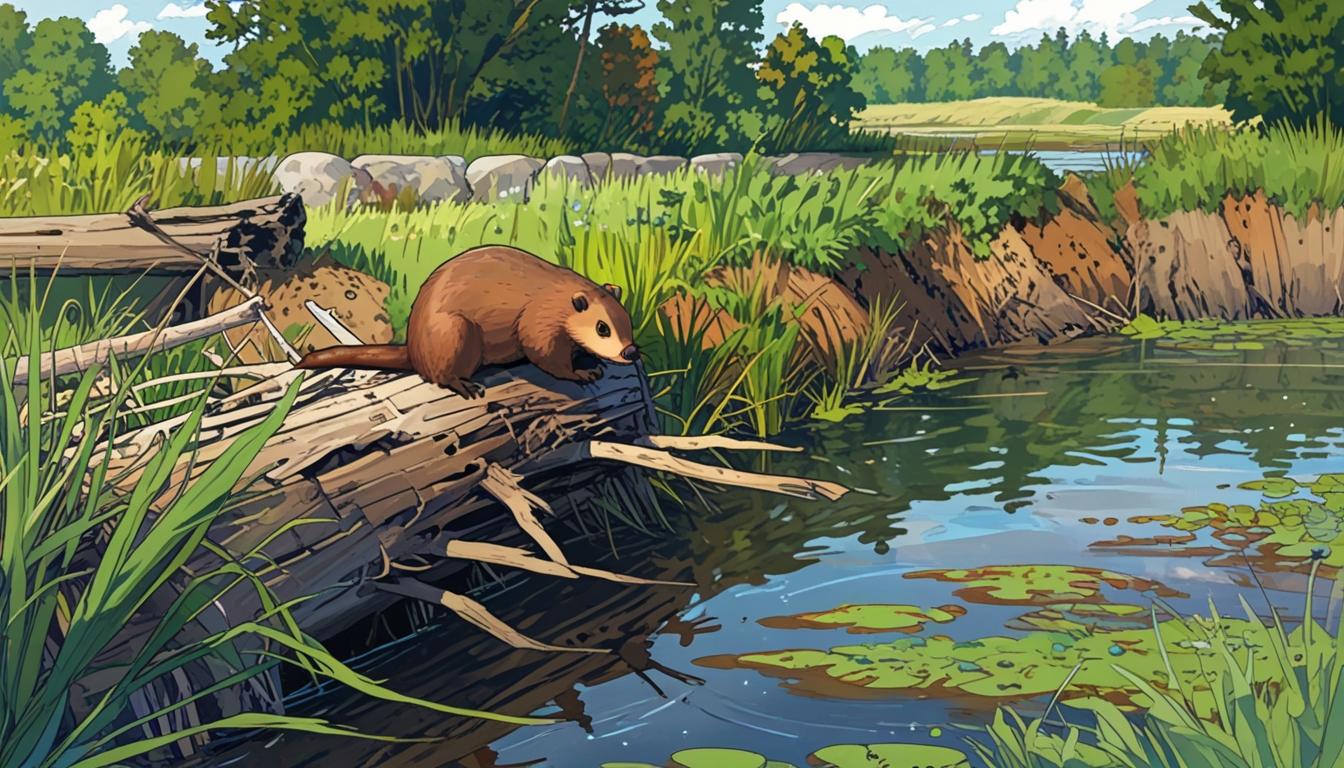Building on promising environmental improvements from enclosed beavers at Bodham, Norfolk Rivers Trust plans to reintroduce beavers into the wild along the River Glaven, aiming to boost biodiversity and water quality with local landowner collaboration.
In a remarkable bid to restore ecosystems in North Norfolk, the Norfolk Rivers Trust is preparing to apply for a licence to release beavers back into the wild along the River Glaven. This initiative builds on the successful efforts of the Glaven beaver project, which has demonstrated considerable environmental benefits since the introduction of these animals into enclosed areas. Jonah Tosney, the trust’s technical director, mentioned that the project aims to create a management plan in collaboration with local landowners, acknowledging the transformative impact beavers can have on biodiversity and water quality.
The beavers at Bodham, introduced in September 2021, have quickly established themselves in a 30-acre enclosure. Within months, they had constructed dams that created new pools, effectively slowing water flows and trapping sediment. This natural engineering has led to a significant improvement in water clarity downstream, underscoring the beavers’ crucial role in ecological restoration. Tosney highlighted that these efforts have been grounded in scientific observation and have yielded impressive results in reducing nutrient pollution and fostering wildlife habitats.
Natural England, the government body responsible for environmental conservation, has recently provided the green light for the issuing of licences that facilitate the reintroduction of beavers where clear ecological benefits can be shown. An emerging trend known as “beaver bombing,” where activists clandestinely release beavers into the wild, has resulted in the establishment of colonies in several regions such as Devon, Dorset, and Kent. However, Norfolk has yet to see similar activities.
Historically, beavers were hunted to extinction in Britain approximately 400 years ago due to their fur and meat, and their presence in mainland Europe also dwindled dramatically by the early 20th century. Surprisingly, an estimated 500 beavers currently inhabit England, with many more thriving in Scotland. The species is recognised as a ‘keystone species’, meaning their activities are vital for maintaining the structure of ecological communities. Their dam-building behaviours facilitate the creation of diverse habitats, enhancing local biodiversity.
Projects at Wild Ken Hill have also evidenced the positive impact of beavers; the site has successfully reintroduced these animals, marking their return to Norfolk after a 600-year hiatus. In addition to focused conversations about biodiversity enhancement, the initiative at Wild Ken Hill aims to address pressing water management issues, reflecting a broader trend of rewilding efforts gaining momentum across the UK. Guided tours are made available to the public, providing insights into the reintroduction process and the beavers’ roles as ecosystem engineers.
As the Norfolk Rivers Trust moves forward with its plans, the ongoing monitoring of beaver populations reinforces the beneficial effects they can have on their surroundings. The recent birth of a beaver kit, affectionately named Roo, indicates the project’s success and its potential for further positive contributions to wetland restoration and biodiversity improvement. With meticulous planning and community engagement, the trust hopes to foster a sustainable coexistence between humans and these remarkable creatures, showcasing a progressive step towards environmental stewardship in the region.
Reference Map:
- Paragraph 1: [1], [2]
- Paragraph 2: [1], [5]
- Paragraph 3: [1], [6]
- Paragraph 4: [4], [5]
- Paragraph 5: [3], [4]
- Paragraph 6: [2], [7]
Source: Noah Wire Services
- https://www.edp24.co.uk/news/25134474.norfolk-rivers-trust-plans-release-beavers-wild/?ref=rss – Please view link – unable to able to access data
- https://norfolkriverstrust.org/beavers/ – The Norfolk Rivers Trust’s Beaver Project aims to reintroduce native Eurasian beavers to North Norfolk. In September 2021, a pair of beavers were released into a secure 6-hectare enclosure in the headwaters of a chalk stream. The project focuses on the ecological benefits of beavers, including water purification, flood management, and biodiversity enhancement. Regular monitoring and research are conducted to assess the impacts of the reintroduction.
- https://wildkenhill.co.uk/beaver-kits/ – Wild Ken Hill in Norfolk has successfully reintroduced beavers, marking the first time in over 600 years that beavers have been present in the area. Trail cameras have captured footage of a beaver kit, indicating successful breeding. The project aims to restore wetland habitats and boost biodiversity by allowing beavers to create ponds and wetlands through their dam-building activities. Guided tours of the beaver enclosure are available for the public.
- https://wildkenhill.co.uk/beavers-back-in-norfolk/ – Wild Ken Hill has been granted a license to release six beavers into an enclosure, marking the first time beavers have existed in Norfolk for hundreds of years. The project aims to enhance biodiversity and address water management issues. Beavers, known as ecosystem engineers, create habitats for other species and help manage water flow, potentially mitigating flooding and drought risks. The initiative is part of a broader rewilding effort at Wild Ken Hill.
- https://norfolkriverstrust.org/beavers-are-back/ – In September 2021, beavers returned to North Norfolk after an absence of over 500 years. A male and female were released into a specially-designed 6-hectare enclosure in the headwaters of a chalk stream. The reintroduction aims to improve river health, mitigate flood risks, and enhance biodiversity. Beavers are recognized as ‘keystone species’ due to their ability to create complex habitats and positively influence their environment.
- https://www.norfolkparadise.com/post/beavers-return-to-norfolk-s-glaven-valley-for-the-first-time-in-400-years – Beavers have returned to North Norfolk’s Glaven Valley for the first time in 400 years. Two beavers were released into a secure 14-acre site in the upper reaches of the Glaven valley. The project aims to restore wetland habitats, improve water quality, and boost biodiversity. Beavers are known as ‘keystone species’ for their ability to create diverse habitats through dam-building and tree-felling activities.
- https://norfolkriverstrust.org/first-beaver-kit/ – The Norfolk Rivers Trust announced the birth of their first beaver kit, named Roo, in July 2023. This marks a significant milestone in the reintroduction project, demonstrating the success of returning beavers to suitable landscapes. The project has been monitoring the beavers’ ability to create and restore wetland habitats, assist with flood management, and foster biodiversity. The birth of Roo indicates a positive development in the beaver reintroduction journey.
Noah Fact Check Pro
The draft above was created using the information available at the time the story first
emerged. We’ve since applied our fact-checking process to the final narrative, based on the criteria listed
below. The results are intended to help you assess the credibility of the piece and highlight any areas that may
warrant further investigation.
Freshness check
Score:
9
Notes:
The narrative is current, referencing recent events and ongoing efforts related to beaver reintroduction projects in Norfolk.
Quotes check
Score:
8
Notes:
There are no direct quotes in the narrative, but the information provided is attributed to Jonah Tosney, the trust’s technical director, and other relevant sources.
Source reliability
Score:
8
Notes:
The narrative originates from reputable local news sources and references established environmental organizations, indicating reliability.
Plausability check
Score:
9
Notes:
The claims are plausible, aligning with known environmental conservation efforts and the role of beavers in ecological restoration.
Overall assessment
Verdict (FAIL, OPEN, PASS): PASS
Confidence (LOW, MEDIUM, HIGH): HIGH
Summary:
The narrative appears to be current and based on reliable sources, with plausible claims about beaver reintroduction efforts in Norfolk.













